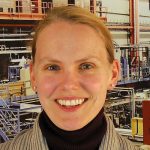Master of Science (MSc), Doctor of Philosophy (PhD)

Irving K. Barber Faculty of Science
| Program | Components | Length |
|---|---|---|
| Master of Science (MSc) | Coursework and thesis | 24 months |
| Doctor of Philosophy (PhD) | Dissertation | 36-48 months |
Why study the Program at UBC Okanagan?
The medical physics graduate program at UBC’s Okanagan campus is accredited by the Commission on Accreditation of Medical Physics Education Programs (CAMPEP). Based in Kelowna, BC, the campus offers tier-one research-based degrees to students in a collegial, close-knit setting.
Our dynamic faculty and students are engaged in a variety of research projects, many in close partnership with the BC Cancer Agency and relevant industry.
Our research-based MSc and PhD degrees in medical physics provide students with theoretical, practical and analytical expertise, as well as experience in the application of scientific results to real-world problems.
The MSc degree is centred on conducting research that addresses current health-care challenges centred primarily around cancer diagnosis and treatment. Graduates of the MSc program are prepared for positions in clinical service and consultation, research and development, teaching or for PhD research.
Program Milestones
- establishing a faculty supervisory committee
- preparing, presenting, and defending a thesis research proposal
- completing thesis research, and writing and defending the work
Coursework & Thesis Requirements
- 33 credits of coursework
- additional coursework may be required, at the discretion of the supervisory committee
- 12-credit MSc thesis (PHYS 549)
Most MSc students complete Teaching Assistantships throughout the duration of their studies.
Exceptional MSc students can transfer to the PhD program after one year if they meet program requirements and are approved by the Graduate Program Advisory Committee.
The PhD degree is centred on conducting original research. Graduates of the PhD program are prepared for careers requiring advanced independent research and teaching in academia, cancer centres, research hospitals, government and industry.
Program milestones
- establishing a faculty supervisory committee
- preparing, presenting, and defending a dissertation research proposal
- passing an oral candidacy examination
- completing dissertation research and writing, and defending the work
Most PhD students complete Teaching Assistantships throughout the duration of their studies.
At the PhD level, courses beyond the MSc are required only at the discretion of the student’s advisory committee.
Research and Supervisors
Supervisors
We invite you to discuss your research interests and career goals with participating faculty and potential supervisors in medical physics, and we are happy to share our excitement about what we study and teach.
Graduate student supervisor
Graduate student supervisor
Graduate student supervisor
Graduate student supervisor
Graduate student supervisor
Graduate student supervisor
Graduate student supervisor
Graduate student supervisor
Graduate student supervisor
Graduate student supervisor
Graduate student supervisor
Graduate student supervisor
Graduate student supervisor
Graduate student supervisor
Labs and Centres
- Medical Physics Laboratory
- Computer Aided Convex Analysis Laboratory (CA2 Lab)
- Optimization, Convex Analysis and Nonsmooth Analysis Collaborative Laboratory (OCANA COLAB)
Learn more about research in the Department of Computer Science, Mathematics, Physics and Statistics and find descriptions of the the centres, institutes and labs that form the foundation of our research efforts.
Students and Alumni
Meet our students
See what our students are up to—find them in our Contact page for their research interests, supervisors, alma maters and info.
Connect with your peers
The Quantitative Sciences Course Union (QSCU) is a student union dedicated to connecting students with each other, the university and the community in order to enhance their research, learning and overall experience at UBC Okanagan.
Theses and Dissertations
Find all UBC Okanagan student publications on the University’s digital repository for research and teaching materials.
EXPLORE STUDENT PUBLICATIONS
Tuition and Funding
Tuition
Tuition amounts presented here are estimates only and all fees are subject to change. For official tuition and fee information, visit the UBC Okanagan Academic Calendar, a comprehensive guide to all programs, courses, services and academic policies at the University of British Columbia.
| Program | Schedule | Domestic (per year) | International (per year) |
|---|---|---|---|
| MSc | Full-time | $5,407.56 | $9,500.19 |
| PhD | Full-time | $5,407.56 | $9,500.19 |
Tuition is paid three times a year, on the first day of each term: Winter Term 1 (September), Winter Term 2 (January), and Summer Term (May).
Funding Opportunities
Graduate students are typically funded through a combination of internal and external funding awards, Teaching Assistantships and Research Assistantships.
Students are expected whenever possible to apply for relevant scholarships and fellowships, including Canadian Tri-Council scholarships and other University Awards.
If students wish to hold off-campus (external) employment, they should discuss with their supervisor, particularly if the student is a grant-holder, as restrictions on hours of work may apply.
Graduate Entrance Award
The Irving K. Barber Faculty of Science offers a $15,000 merit-based entrance scholarship to three exceptional individuals entering their first year of thesis-based graduate studies under a supervisor from the Irving K. Barber Faculty of Science, or an Interdisciplinary Graduate Studies program with a supervisor who is a member of the Irving K. Barber Faculty of Science.
All applicants to Irving K. Barber Faculty of Science graduate programs who have submitted an application by January 31 will be automatically considered for the award. No additional application is required. Successful applicants will be notified by March 15.
Assistantships
The Department of Computer Science, Mathematics, Physics and Statistics has funding opportunities and assistantships available for qualified students.
| Program | Minimum funding | Duration |
| MSc | $24,000 per year | 2 years |
| PhD | $26,000 per year | 4 years |
Teaching Assistantships (TA)
Paid TA positions allow graduate students to develop skills in teaching, supervision, facilitation, and student assessment. Teaching assistants may lead seminars, help teach undergraduate courses, or assist in student evaluations and marking.
- MSc students are eligible for paid TA positions for up to two years.
- TA positions usually occur September to April. TA hours and wages are governed by the British Columbia Government Employees Union (BCGEU).
Teaching assistants are mentored by their supervisor and via the Centre for Teaching and Learning. To learn more or apply for a position, see our Careers page.
Research Assistantships (RA)
As paid research assistants, graduate students assist their supervisor or other researchers in conducting high-level research. RAs are typically funded by a supervisor’s external grants, contracts or other sources of funding, and, therefore, are not guaranteed.
Research Assistantships are wholly dependent upon individual research supervisor’s funding. RA positions may take place at any time during the school year and wages and hours will vary. RA positions are not guaranteed. Talk to your potential supervisor about RA opportunities.
Scholarships and awards
UBC Awards
The College of Graduate Studies administers merit-based graduate awards at the Okanagan campus. The College manages a number of award competitions each year and administers payment of all internal awards and selected external awards.
External Awards
All prospective graduate students (Domestic and International) should explore and apply for external awards and fellowships, including awards offered by Canada’s three research councils: CIHR, NSERC and SSHRC.
Graduate scholarships and awards may also be available from foundations, private organizations or foreign governments (check with your country’s education authority).
Global and Close-Knit
At UBC Okanagan, you gain all the benefits of attending a globally ranked, top 5% university while studying in a close-knit learning community. 50% of graduates, from all across the globe, choose to stay in the region.

Discover the Okanagan
A diverse natural region with sandy beaches, beautiful farms, vineyards, orchards and snow-capped mountains, the Okanagan is an inspirational landscape perfect for those seeking leisure or outdoor adventure.
UBC's Okanagan campus borders the dynamic city of Kelowna, a hub of economic development with a population of more than 150,000 people— the fourth fastest-growing population in Canada.








